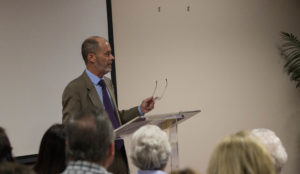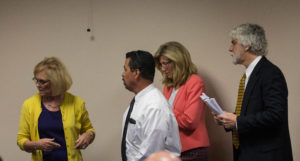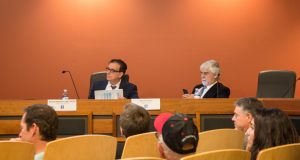
In a potential setback for the Tulare Local Healthcare District, Visalia attorney Mike Lampe was disqualified from representing the district in a Kern County lawsuit against its former law firm, BakerHostetler, its former attorney, Bruce Greene, and some of its past board members.
The case was moved to Kern County after Greene and BakerHostetler argued that they would be unable to receive a fair trial in Tulare County. Greene and the firm claim that they will call Lampe as a witness, and that he could not be both a witness and an attorney for the district without confusing the jury.
The board met Friday morning to decide its next steps following the ruling on Wednesday, but no action was reported out. The board is still reviewing its possible options, according to Board President Kevin Northcraft.
The district’s board could appeal the ruling – the Orange County Bar Association states that California courts “have allowed parties to file an immediate appeal of orders disqualifying their attorneys” – or simply select new counsel.
In his ruling, Kern County Judge Thomas S. Clark wrote that he agreed with arguments by attorneys for Greene and the Baker firm that Lampe could not be both a witness in the case and an attorney fighting for the Tulare district.
“There is a very real danger that the jury will be confused and have difficulty distinguishing between evidentiary statements of witness Lampe and advocacy statements of attorney Lampe,” Clark wrote. “Even without a conscious desire to exploit this dual role as Defendants suggested, the danger exists and it would be very difficult for the Court to undo and untangle these issues at the time of final argument.”
In filings, Lampe claimed that the issue was raised “for purely tactical reasons” and objections are being raised now in order to put the district at a disadvantage; he wrote that his firm has “logged over 1,000 hours of attorney billing time in this case.”
Lawsuit claims breach of fiduciary duties, negligence

The Kern County suit, lodged by the district in 2019, alleges that Greene and the Baker firm, as well as past district board members Linda Wilbourn, Parmod Kumar and Richard Torrez, breached their fiduciary duties to look out for the district’s best interests.
The board members allegedly did so by giving Healthcare Conglomerate Associates (HCCA) – the district’s former hospital management partner – and its CEO Benny Benzeevi the ability to pursue up to $22m in funding, under any terms they found agreeable, without additional approval by the board.
That resolution was later used by HCCA to sell some hospital equipment to Celtic Leasing for $3m under a sale-leaseback arrangement on August 30, 2017. The district would then repay the loan at approximately $82,000/mo or risk losing the equipment.
The suit additionally alleges Greene and the Baker firm were negligent and caused a breach of contract by not adequately disclosing to the prior board the full extent of conflicts that may have existed: they represented: HCCA, the district’s contractor; Benzeevi, in a personal capacity; and the hospital district simultaneously between May 2015 and July 2017.
(From January 2016 until July 2017, the two also represented another HCCA client, the Southern Inyo Healthcare District. A judge in Southern Inyo’s bankruptcy case wrote that conflict waiver letters the Baker firm had provided to HCCA and Southern Inyo – signed by Greene – were “ineffective,” “lacking full disclosure,” and “not informed.”)

Greene and the firm also allegedly breached their fiduciary duties to the district – amongst other allegations – by drafting the $22m resolution, knowing that some proceeds from the loan would be used to repay legal bills that were due. Emails from Greene at the time state that funding was considered “CRITICAL.”
Greene, Benzeevi, and former HCCA CFO Alan Germany are all facing felony charges related to their roles in managing the district’s hospital, including the $3m loan, after an investigation that the Tulare County District Attorney has called the “largest [one] ever undertaken” by his office.
Lampe cannot be “advocate” and “witness,” Greene and Baker say
Harlan Watkins, an attorney representing Greene and the Baker firm, states in filings that Lampe will be a key witness to the case that he filed on behalf of the district.
“Allowing a single individual to simultaneously serve both roles collapses the distinction between advocacy [for a client] and evidence, inviting confusion into the judicial process and jurors’ minds,” Watkins wrote in a December 30 filing.
A person can either be an “advocate” for their client – the role of an attorney – or a witness giving impartial testimony, Watkins writes, but allowing Lampe to represent the District would give the district an unfair advantage, “confuse evidence and argument,” and “call into question the fairness of the proceeding itself.”
Watkins goes farther, claiming that Lampe caused some of the damages that he is suing over.
“His involvement is so central, that not only is he a key witness to over $2 million of damages claimed by the District, he is a proximate cause of those damages,” Watkins writes. (Emphasis from the filing.)
$500,000 of that figure is from a settlement paid from the hospital district to Celtic in order to recover equipment, and $1.8m is from the hospital’s settlement with HCCA in order to regain full control over the Evolutions Gym property.
Those payments wouldn’t have been necessary if Senovia Gutierrez was properly seated as a board member, district officials claim. The district alleges Greene was behind the months-long delay to “recognize” Gutierrez as a board member: although she was elected in July 2017, she was not “recognized” as a board member by the board until September 27, 2017.
Greene, Baker flip the script on allegations
The district additionally alleges that Greene and the Baker firm dragged their feet on seating Gutierrez so that debts to them could be repaid from the $3m loan – if she took her seat on the board at that meeting or at any time before August 30, 2017, she would have voted with Northcraft and Jamaica to revoke HCCA’s authority to take out loans and subsequently repay the law firm.
Watkins writes that Lampe, not Greene, caused that loan to be taken out because he blocked Gutierrez from being seated.
Lampe asked board member Mike Jamaica to leave in order to deny Wilbourn a quorum at the July 26, 2017 hospital board meeting, Watkins writes, preventing the board from seating Gutierrez as a board member.
“Greene and Baker are intentionally misleading the court with the argument that, ‘Gutierrez was not seated due to Lampe’s interference,'” Lampe wrote in response.
View noteThe July 26 meeting was contentious: the agenda referred to Gutierrez as a board member in the future tense, and was filed as a “Chair Announcement” with the statement that “As a result of the recent special election on July 11, 2017, Senovia Gutierrez will replace Dr. Parmod Kumar as a Board member.”
Wilbourn opened the meeting by stating that “there are some legal opinions that are not agreeing as to whether the board has to certify in a special recall election,” whether the certification has to be specified as a “regular board agenda item,” and that “as a chair announcement, it’s not in the body of the agenda.”
Wilbourn would later claim that Greene and the Baker firm told her that Gutierrez “should not be seated as a Board member at the July 26 board meeting.”
She said she would ask Greene and Gutierrez’ attorney, Dennis Mederos, to give their legal opinions, but Jamaica never appeared at the dais, and the meeting was adjourned.
Lampe was a key reason that Gutierrez was not seated, Watkins states, because he asked Jamaica to leave the meeting. But numerous blocks were put in the way before Gutierrez was seated on September 27, 2017:
- On July 26, 2017, an attorney representing Kumar – who was recalled and replaced with Gutierrez – claimed that Gutierrez’ swearing in was a Brown Act violation.
- On August 23, 2017, Wilbourn resigned from the board effective at 12:00pm; a meeting was scheduled later that day. With Torrez absent and Gutierrez’ status unclear, Northcraft and Jamaica would have constituted a majority of the board and a quorum. Wilbourn claims that Greene asked her to delay her resignation to the next day, ostensibly to prevent a quorum.
- On August 25, 2017, Greene and the Baker firm used Kumar’s attorney to provide an opinion stating Gutierrez was not a board member, adding that Wilbourn declined to seat Gutierrez due to a late election certification delivery and Brown Act concerns. The letter was provided to Celtic in order to secure the $3m Celtic loan.
- On September 17, 2017, attorneys for HCCA – represented by the Orrick firm – and Torrez, represented by BakerHostetler, resisted attempts to force Torrez to recognize Gutierrez as a fellow board member, in a case that Tulare County Judge Melinda Reed ultimately dismissed.
Whether Gutierrez could have been seated on July 26 is “disputed and a central issue of this case,” Watkins wrote.
Lampe claims the disqualification is purely tactical
In a deposition filed with the court, Lampe contends that the move to remove him from the case was a “clumsy attempt to mislead the court” and was brought for “purely tactical reasons designed to create great expense to the District by forcing it to secure replacement counsel.”
Although the case was filed in April of 2019, attorneys for Greene and the Baker firm first stated they would file a motion to disqualify Lampe from the case in October 2020, before finally filing on December 30, 2021.
Even if the intent was to purely secure a tactical advantage, Judge Clark wrote that the risks of confusing jurors is real:
“The Court responded that even if there is some truth to that accusation, Defendants have already actually deposed Mr. Lampe and made it clear that they intend to elicit the referenced testimony at trial. This triggers the issues discussed herein,” he wrote.
View noteCurrently, Lampe operates under a contingency agreement in the case, according to a deposition document. He will be paid “one-third of the net recovery in this case after the costs have been reimbursed to whoever pays them.”
Unless a new firm is willing to work under a similar contingency agreement, the district could be forced to begin shouldering significant costs during the litigation – costs that its adversary, ranked the 73rd largest law firm in the world in 2019, can likely easily absorb.
Dig deeper
View all of the filings in the case at the Voice’s DocumentCloud page by clicking here.
Watkins was contacted for comment but did not respond by publication time. If a response is received, this article will be updated.
